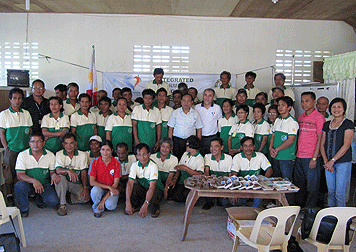Forty-two residents from different barangays in the town of Victoria, Oriental Mindoro participated in a comprehensive five-day Integrated Farming Bio-System (IFBS) training which gave them the necessary skills and knowledge in modern organic farming, animal husbandry, and vegetable farming.
A project of the Malampaya Foundation, Inc. (MFI), IFBS is part of its sustainable development thrust for communities in Oriental Mindoro, with the aim of empowering its trainees towards self-sufficiency and entrepreneurship.
Acting Provincial Agriculturist for Oriental Mindoro Pedro Dimailig said that through IFBS and its other projects, Malampaya has set the example for corporate social responsibility. “IFBS has found an ally with Governor Alfonso Umali’s thrust of maximising all agriculture areas for productive use by its constituents,” Dimailig said during the IFBS graduation ceremony held at the Knights of Columbus building in Poblacion Dos, Victoria last August 12, 2011.
At the event, Dimailig also announced that Oriental Mindoro has improved its socio-economic status, ranking 12th among the poorest provinces in the country in 2009, and moving all the way up to the 44th spot this year.
MFI Executive Director Luke Esteban likewise expressed his gratitude to the provincial officials of Oriental Mindoro as well as to the municipal officials of Victoria, for their warm reception of IFBS which he said could very well address the issue of poverty in the province.
“The training does not end in this graduation, I am sure, you can use it in your farms and you can share the knowledge with your neighbours as we all aim to attain the full potential of Mindoro as an agricultural province,” Esteban told the graduate-trainees.
Mindoro has become a special focus of MFI projects because of its acknowledged status as the rice granary and food basket of the MIMAROPA (Mindoro-Marinduque-Romblon-Palawan) region. But MFI Programme Manager Teddy Bolivar said the foundation has also conducted the IFBS in Palawan and Batangas, and in secondary class municipalities like San Teodoro and Baco, where it has proven to be very helpful.

Mindoro has become a special focus of MFI projects because of its acknowledged status as the rice granary and food basket of the MIMAROPA (Mindoro-Marinduque-Romblon-Palawan) region. But MFI Programme Manager Teddy Bolivar said the foundation has also conducted the IFBS in Palawan and Batangas, and in secondary class municipalities like San Teodoro and Baco, where it has proven to be very helpful.
Dimailig said the provincial government and its private sector partners like Malampaya will continue to educate the people to avoid the importation of foods that can otherwise be grown locally. He revealed that he is eyeing the establishment of central buying stations that could serve as venues for the selling of locally grown food products, with the help of Malampaya and other non-governmental groups. At the graduation ceremony, Alejandro Fajardo, Adelina Vicente and Larry Mazo, three participants from Victoria, spoke about the benefits of the IFBS training. Fajardo said that he learned important information on environment issues, while Vicente said she is now wary of using chemicals fertilisers after learning how to produce organic fertilisers using indigenous substances. Mazo for his part said that the lecture on the destructive effects of illegal logging and the “kaingin” system (slash and burn farming), and learning the technique of how to revitalise soil had the most impact on him.
The participants also learned how to cook spicy fish, smoked fish, and the technique of making boneless bangus (milkfish) with the help of trainers from the Bureau of Fisheries and Aquatic Resources (BFAR).
Victoria Mayor Alfredo Ortega Jr. was represented by Melgar Fadriquilan, who relayed his gratitude to Malampaya for all its efforts, and who conveyed the town’s pledge of continuous support for all its ongoing developmental programmes in the province. [SPEX Communications]






